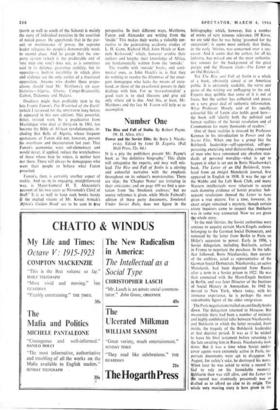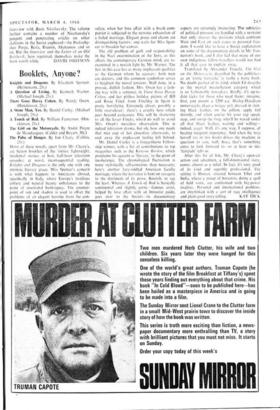Number One
IT is a pity the publishers present Mr. Payne's book as 'the definitive biography.' This claim will antagonise the experts, and may well mis- lead. The Rise and Fall of Stalin is a stirring and colourful narrative with the emphasis throughout on its subject's monstrosities. There are slips; the 'Chapter Notes' are irritating in their omissions; and on page 450 we find a quo- tation from 'the Smolensk archives,' but no source reference is given, while Merle Fainsod's edition of these party documents, Smolensk Under Soviet Rule, does not figure in the
bibliography; which, however, lists a number of works of very tenuous relevance. Of Kirov, we are told that he was being 'groomed for the succession'; it seems most unlikely that Stalin, in the early 'thirties, was concerned over a suc- cessor. And it seems that the author, for all his industry, has missed one of the most authorita- tive sources for the background of the great purges and the Moscow trials—The Letter of an Old Bolshevik.
Yet The Rise am! Fall of Stalin is a whale of a book, obviously aimed at an American public. It is extremely readable, the verve and gusto of the writing are unflagging to the end. Experts may quibble that some of it is out of focus, but the author has collected and passes on a very great deal of authentic information. What Professor Mosely said of his equally colourful life of Lenin also holds good here- * book will 'clarify both the political and human realities of the Soviet revolution and of Communism for many thousands of readers.'
One of these realities is stressed by Professor Kennan in his introduction to Power and the Soviet Elite. When one has a group like the Bolshevik leadership—self-appointed, self-per- petuating, exercising total dictatorship, composed of men who have renounced any absolute stan- dards of personal morality—what is apt to happen is what is set out in Boris Nicolaevsky's book. The Letter of an Old Bolshevik, trans- lated from an émigré Menshevik journal, first appeared in English in 1938. It was the age of the Webbs and the Left Book Club, and many Western intellectuals were reluctant to accept such damning evidence of Soviet practice. Sub- sequent revelations showed the Letter to have given a true picture. For a time, however, its eXact origin remained a mystery, though certain akute inquirers came to suspect that Bukharin was in some way connected. Now we are given ti!e whole story.
' In the mid-'thirties, the Soviet authorities were anxious to acquire certain Marx-Engels archives belonging to the German Social Democrats, and removed by the latter from Berlin to Paris on Hitler's accession to power. Early in 1936, a Soviet delegation, including Bukharin, arrived in France to negotiate the purchase. In the talks that followed, Boris Nicolaevsky, then curator of the archives, acted as representative of the German Social Democrats. Nicolaevsky, an active Menshevik, had been deported from Russia after a term in a Soviet prison in 1922. He was then connected with the Marx-Engels Institute its Berlin, and was later Director of the Institute of Social History in Amsterdam. In 1942 he moved to New York, where today, with his immense experience, he is perhaps the most redoubtable figure of the older emigration.
The Paris negotiations trailed on and finally broke down. The delegation returned to Moscow. But meanwhile there had been a number of intimate and highly confidential talks between Nicolaevsky and Bukharin in which the latter revealed, from inside, the tragedy of the Bolshevik leadership at that decisive period. It was as if he wished to leave his final testament before returning to the fate awaiting him in Russia. Nicolaevsky took notes. But it was a time when Soviet under- cover agents were'extremely active in Paris; im- portant documents were apt to disappear. In August, for safety's sake, he destroyed his notes. When later he was asked to write a record he had to rely on his formidable memory. Ilukharin then was still alive, and the Letter (as the record was eventually presented) was so drafted as to afford no clue to its origin. The whole very moving story is here given in the Interview with Boris Nicolaevsky. The volume further contains a number of Nicolaevsky's pungent and penetrating articles on other skeletons in the Soviet cupboard—the Poskreby- shev Purge, Beria, Riumin, Abakumov and so on. But the Interview and the Letter of an Old Bolshevik, here reprinted, themselves make the



































 Previous page
Previous page